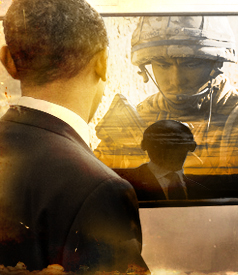Support justice-driven, accurate and transparent news — make a quick donation to Truthout today!
Washington – The most dreadful burden of the presidency – the power to send men and women to die for their country – seems to weigh heavily on Barack Obama these days. He went to Dover Air Force Base to salute the coffins of fallen troops. He gave a moving speech at the memorial service for victims of last week’s killings at Fort Hood. On Veterans Day, after the traditional wreath-laying at Arlington National Cemetery, he took an unscheduled walk among the rows of marble headstones in Section 60, where the dead from our two ongoing wars are buried.
As he decides whether to escalate the war in Afghanistan, Obama should keep these images in mind. Geopolitical calculation has human consequences. Sending more troops will mean more coffins arriving at Dover, more funerals at Arlington, more stress and hardship for military families. It would be wrong to demand such sacrifice in the absence of military goals that are clear, achievable and worthwhile.
And what goals in Afghanistan remotely satisfy those criteria?
The Washington Post reported Wednesday that the U.S. ambassador in Kabul, Karl Eikenberry, recently sent two classified cables to officials in Washington expressing what the newspaper described as “deep concerns” about sending more troops now.
Gen. Stanley McChrystal, chosen by Obama to lead U.S. forces in Afghanistan, has asked for perhaps 40,000 additional troops to carry out a counterinsurgency campaign. Armchair Napoleons in Washington, comfortably ensconced in their book-lined offices, insist that Obama must “listen to the generals.” But Eikenberry was a four-star general until Obama named him ambassador earlier this year. He commanded U.S. troops in Afghanistan in 2006-07. He needs to be heard as well.
In what were described as sharply worded cables, Eikenberry reportedly expressed serious doubts about the willingness of Afghan President Hamid Karzai to tackle the corruption and mismanagement that have made his government so unpopular and ineffectual – and that have allowed the Taliban to effectively regain control of much of the country.
Karzai, you will recall, committed what observers described as widespread, blatant election fraud in “winning” a new term in office. In many parts of Afghanistan, the Karzai government is seen as so weak and corrupt that the Taliban has been able to move in as a lesser-of-two-evils alternative.
It is axiomatic that a successful counterinsurgency program requires a partnership with a reliable, legitimate government. If the Karzai regime is not such a partner, the goal that McChrystal would be pursuing with those extra 40,000 troops is not achievable.
Obama is also reported to be considering scenarios in which he would send roughly 30,000 extra troops, somehow convincing our unwilling NATO allies to make up the difference, or send about 20,000 troops and modify the McChrystal plan, opting instead for a “hybrid” strategy that’s part counterinsurgency, part counterterrorism. I’m skeptical that either of these options sets goals that are achievable, and I’m certain that neither sets goals that are clear.
Following his visits to Dover, Fort Hood and Arlington Cemetery, Obama should focus the attention of the White House and the Pentagon on a question that too often is overlooked: What troops?
Our all-volunteer armed forces have been at war for eight years with no end in sight, serving tours of duty of up to 15 months in the war zones of Iraq and Afghanistan. Many units have been called to serve multiple tours. By contrast, most Vietnam War veterans served a single one-year tour.
Fighting two big simultaneous wars with our armed forces stretched so thin has put enormous emotional, psychological and economic stress on military families. The suicide rate in the armed forces has climbed steadily, as has the incidence of stress disorders among veterans. The Pentagon is adept at shuttling its people around and has worked out how to provide the 40,000 troops McChrystal wants. But any new deployment would come at a heavy cost – a human cost – far beyond the billions of dollars required to train, equip, transport and maintain the units being sent.
There are reports that Obama has refused to sign off on any plan until his advisers tell him how they propose to end the expanded war they advocate. But this sounds like just another way of saying: Tell me how we’re going to fix the mistake we’re about to make.
As long as our goals in Afghanistan remain as elusive as they are now, Obama shouldn’t be sending troops. He should be bringing them out.
————
Eugene Robinson’s e-mail address is [email protected].
(c) 2009, Washington Post Writers Group
A terrifying moment. We appeal for your support.
In the last weeks, we have witnessed an authoritarian assault on communities in Minnesota and across the nation.
The need for truthful, grassroots reporting is urgent at this cataclysmic historical moment. Yet, Trump-aligned billionaires and other allies have taken over many legacy media outlets — the culmination of a decades-long campaign to place control of the narrative into the hands of the political right.
We refuse to let Trump’s blatant propaganda machine go unchecked. Untethered to corporate ownership or advertisers, Truthout remains fearless in our reporting and our determination to use journalism as a tool for justice.
But we need your help just to fund our basic expenses. Over 80 percent of Truthout’s funding comes from small individual donations from our community of readers, and over a third of our total budget is supported by recurring monthly donors.
Truthout’s fundraiser ended last night, and we fell just short of our goal. But your support still matters immensely. Whether you can make a small monthly donation or a larger one-time gift, Truthout only works with your help.
